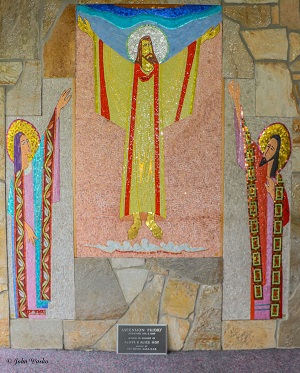Dorothy Day: Benedictine Oblate
John O'Hagan
Dorothy Day, well known as a pacifist, social gadfly, advocate for the downtrodden, and constant prod to the American conscience was also, unknown to most, a professed Oblate of a Benedictine Monastery. In 1955, at the age of 58, Dorothy Day became an Oblate of St. Procopius Abbey in Lisle, Illinois. This relatively "late in life" commitment, from a woman who had committed virtually her entire adult life to social justice issues is telling of both the woman and of the Benedictine life style which attracted her.
Dorothy Day was born in 1897. Her early adult life was what might only be described as bohemian and hedonistic. Eugene O'Neill was a friend and possibly one of her lovers. Her autobiographies discuss night-long drinking episodes and friends dying of heroin overdoses; she lived in a common law marriage, had at least two pregnancies and one abortion, and somehow found God through the gift of giving birth to a daughter. She was, as the times dictated, a suffragette, co-founder of the Catholic Worker Movement, steadfast pacifist throughout some of the century's most horrible wars, faithful servant of the Catholic Church, and always a voice for Christ-like love and acceptance. Dorothy Day is probably one of the few people in the world who would have been able to say that they had been prosecuted for pacifist activities in World War I, the Spanish Civil War, World War II, Vietnam, and even the Cold War. (She was jailed in New York City in 1956 for refusing to take part in a Civil Defense Drill.)
Although pacifism became her enduring legacy, it was her work for the poor, the displaced, and the socially unacceptable, which consumed almost her whole life. Whether in homes and meals for the dispossessed of our society or communal farms that might support the urban shelters, Dorothy's legacy continues today. There are Catholic Worker chapters in most major American cities (including Boise.) Dorothy never stopped protesting against war, she constantly fought a battle for just wages, including one with the Cardinal of New York City, she opposed with all her fervor racism and she knew from personal experience the inequities of our justice and political systems. The homeless, the poor, and the dispossessed however, were her abiding concern. It is in this work that we see Dorothy Day as a person of Benedictine Spirituality long before she became an Oblate. Her oblation in 1955 was really just a manifestation of a lifetime of living the Rule of St. Benedict, whether consciously or not. Several excerpts from her life illustrate this.
"All guests who present themselves are to be welcomed as Christ . . ." (Rule of Benedict 53 .1)
Dorothy Day was not just the founder, but a worker in Catholic Worker houses and shelters through some of this country's most depressed economic times. Depression or not Dorothy was clear that the homeless and desperate, no matter what were the circumstances that had bought them low, were to be welcomed. "It is always a terrible thing to come back to Mott Street. To come in a driving rain to men crouched on the stairs, huddled in doorways, without overcoats, because they sold them, perhaps the week before when it was warm, to satisfy hunger or thirst, who knows. Those without love would say, "It serves them right, drinking up their clothes.' God help us if we got just what we deserved."1
"The divine law is read to the guest for his instruction and after that every kindness is shown to him." (Rule of Benedict 53.9)
Prayer and a rigorous prayer life were integral to Dorothy's work. Her rosary and her breviary accompanied her no matter where she was, Mott Street in New York, with sharecroppers in Alabama, in the grape fields of Delano, or indeed in Rome as an observer at Vatican II. She lamented, shortly before her death, those who would attempt the futility of good works, without prayer.
"A social worker asked Dorothy one day how long the down and out were allowed to stay at the Worker. "We let them stay forever,' Dorothy answered. "They live with us, they die with us and we give them a Christian burial. We pray for them after they are dead. Once they are taken in they become members of the family. Or rather they were always members of the family. They are our brothers and sisters in Christ.'"2
"Idleness is the enemy of the soul. Therefore, the brothers should have specified periods for manual labor, as well as for prayerful reading" (Rule of Benedict 48.1)
"Jobs and Journeys," "Labor," "Paper, People and Work" are titles of chapters in Dorothy Day's autobiography, "The Long Loneliness." Dorothy Day was no idealistic socialist, who envisioned a society of eternal largesse. She worked virtually her entire life, often in menial and unpleasant jobs, a nurse's aide in a state hospital, a cashier in a restaurant, a clerk at Montgomery Wards, a copywriter, and reporter. She brought her work ethic to her social crusades. She mentions in one of her pieces that pressed to arrive at an accounting they determined that St. Joseph's House of Hospitality had in one year prepared and distributed 460,000 meals and 18,250 nights of lodging. She is quick to add, "I am sure God is not counting the meals." God, in her view was instead looking at those residents of the house who got up at five every morning to go downstairs, start the coffee, and cut the bread to feed their fellow unfortunates. And always with work, as Benedict admonished, came prayer. "What do I talk to myself about? When I am truly alone, with no babies around, as when I am alone in church, I pray. I say the rosary, I read my Psalms. At home kneeling by my bed, or, in the bitter cold, lying in bed, my prayers are brief, half conscious, and the planning, the considering, the figuring of ways of "making ends meet" goes on. Until I catch myself and turn to God again. So I pray for Russia, for our own country, for our fellow men, our fellow workers, for the sick, the starving, the dying, the dead."3
"At the door of the monastery, place a sensible old man who knows how to take a message and deliver a reply, and whose age keeps him from roaming about." (Rule of Benedict, 66.1)
All, even the difficult, were welcomed at the Catholic Worker houses and farms. Dorothy tells the story of a Mr. O'Connell who was garrulous, argumentative, and generally unpleasant to just about all he came in contact with. The young people were loafers, and the older ones thieves and drunkards in his view. All of them of course were pacifists and he was a retired soldier (or mercenary) of several services and countries. He was something of a carpenter though and his skills were useful on a farm eking out a subsistence existence. He apparently actually built for Dorothy the coffin in which she was buried. (She used it to store blankets until the eventuality arose.)
As Mr. O'Connell grew older and more unpleasant they had to find a way, for everyone's health and sanity, of separating him from the community. Thus he became the gatekeeper at Maryfarm, a Catholic Worker community in Pennsylvania. He had a little cabin on the road at the entrance to the farm. Dorothy in telling this story, actually alludes to the above rule. "According to St. Benedict, there should be a benevolent old man at the gate to receive the visitors, welcome them as other Christs, exemplify hospitality."4
Dorothy Day formally became a Benedictine Oblate 23 years after she founded the Catholic Worker. Dorothy Day however had been a disciple of Benedict all her life.


